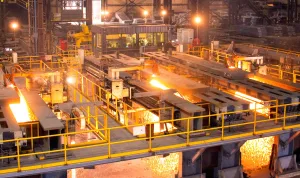How Steel Prices Influence Nucor Corporation’s Stock: A Comprehensive Analysis

Nucor Corporation, a leading steel producer, operates in a market where steel prices play a crucial role in determining financial performance and stock value. This article delves into how changes in steel prices impact Nucor Corporation’s stock, providing a detailed analysis of the relationship between market trends and investor perceptions.
The Steel Price-Stock Performance Connection
1. Steel Price Fluctuations and Revenue Impact
Steel prices have a direct impact on Nucor’s revenue and profitability. As a major steel producer, Nucor’s revenue is closely tied to the prices it can command for its products. When steel prices rise, Nucor typically benefits from higher revenue, which can positively influence investor sentiment and drive up the stock price. Conversely, falling steel prices can compress margins and lead to reduced earnings, potentially causing the stock price to drop.
2. Profit Margins and Cost Management
The relationship between steel prices and Nucor’s stock also involves profit margins. Steel price fluctuations affect the cost of raw materials and production expenses. Nucor’s ability to manage these costs efficiently is crucial for maintaining healthy profit margins. When steel prices are high, Nucor may experience improved profit margins, positively impacting stock performance. However, if the company cannot offset rising costs with higher prices, profit margins may decline, affecting stock value.
3. Market Sentiment and Investor Confidence
Investor confidence is influenced by market conditions and financial performance. Rising steel prices often signal a robust steel market and strong demand, which can boost investor confidence in Nucor’s stock. Positive market sentiment may drive up the stock price as investors anticipate higher future earnings. On the other hand, declining steel prices can raise concerns about the company’s profitability, leading to decreased investor confidence and a potential decline in stock value.
Key Factors Affecting the Price-Stock Relationship
1. Global Steel Market Trends
Global steel market trends, including supply and demand dynamics, economic growth, and trade policies, play a significant role in shaping steel prices. Nucor’s stock is influenced by these broader market trends as they impact the company’s financial performance. For instance, an increase in global steel demand can drive up prices, benefiting Nucor’s stock.
2. Production and Efficiency Improvements
Nucor’s focus on operational efficiency and technological advancements can mitigate the impact of steel price fluctuations. The company’s investments in innovative production methods and cost-saving technologies can enhance its ability to maintain profitability despite changing steel prices. These improvements can positively influence investor perceptions and contribute to a stable or rising stock price.
3. Economic and Geopolitical Factors
Economic conditions, such as inflation, interest rates, and exchange rates, impact steel prices and, consequently, Nucor’s stock. Geopolitical events and trade policies also affect market conditions and steel pricing. Nucor’s ability to navigate these factors and adapt its strategies is crucial for maintaining stock performance.
4. Financial Reporting and Forecasts
Nucor’s financial reports and forecasts provide insights into the company’s performance and outlook. Strong financial results and positive earnings guidance can enhance investor confidence and support a higher stock price. Conversely, weak financial performance or negative forecasts can lead to stock price declines.
Conclusion
The price of steel has a profound impact on Nucor Corporation’s stock, influencing revenue, profit margins, and investor sentiment. Understanding the relationship between steel prices and stock performance is essential for investors and market analysts. By monitoring market trends, production efficiency, and economic factors, Nucor navigates the complexities of steel pricing and its effects on stock value. The company’s ability to manage these dynamics plays a key role in maintaining investor confidence and achieving long-term stock performance.



